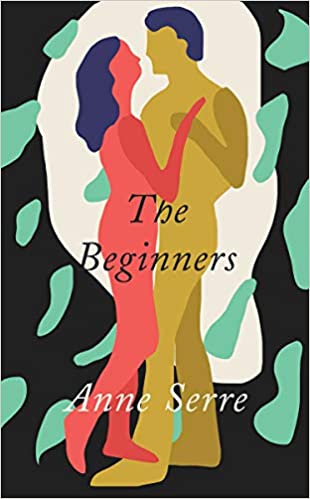French writer Anne Serre’s debut novel, The Governesses, appeared in 1992 but was not translated into English until 2018, by which time Serre had published another thirteen. The Beginners has taken only ten years to be translated – once again by Mark Hutchison – following on from The Fool and Other Moral Tales in 2019. Serre has said that “What determines the start of a novel is a sentence that pops up all of a sudden and seems to me to contain an entire book,” and, certainly, the first sentence of The Beginners, as ordinary as it might appears, contains the entire focus of the novel:
“In August 2002, Anna Lore, aged forty-three, fell madly in love with Thomas, age fifty-six.”
The parenthetical ages suggest a newspaper story rather than a novel, and give some sense of the detached tone with which the story will be told. Anna’s love for Thomas is problematic as she is already in a twenty-year relationship with Guillaume, one which, she is happy to admit, it is difficult to fault:
“Their life was happy and had never come up against the deadweight of boredom or routine, they still made passionate love, travelled from time to time, seldom quarrelled, he was an architect, she wrote for art magazines, she had a childlike trust in him, he looked on her as a marvel.”
Anna’s situation is not new to fiction but Serre’s approach is playful, with the insertion of the couple’s occupations into the list a shorthand for a particular genre of comfortable middle-class relationship angst, followed by the hyperbolic description of their flawless love. This is no defence, however, against meeting Thomas, a man she only vaguely knows, in the street, and beginning a polite conversation which she dismisses as “of no great importance” but:
“In reality she was already strongly attracted to him and had been from the moment she’d set eyes on him, but she brushed that away into a corner at the back of her mind.”
In the next few months their relationship, such as it is, centres on the hope of running into each other again, with neither of them prepared to take decisive action. Anna, meanwhile, feels guilty about not being happier with Guillaume, while realising for the first time (as he tries to please her, suspecting that something has changed) that Guillaume “wasn’t bound to her body and soul, but had ideas and plans of his own.” The idea that they are an indivisible unit has weakened, but she still loves him, seeing Guillaume and Thomas as “two sides of a coin.” Entirely convinced of her love for Thomas (and of his for her), there is still little in the way of evidence. When they do finally meet again:
“Thomas didn’t flirt with her at all, he didn’t so much as glance at her even, but their love was already at its height.”
As the novel is presented from Anna’s viewpoint, we can only guess at Thomas’s motives, though he may sense that she is reluctant to begin an affair. Serre follows Anna’s thoughts and emotions in detail, though with, as has already been mentioned, a detached, almost playful, tone, to the exclusion of all else. This prolongs a potentially dramatic situation as, in Serre’s words, Anna’s “folly hurtles back and forth” like a “terrifying fairground attraction” to the point that it might stretch the reader’s patience; certainly, Serre is not primarily concerned with suspense. Even sections of the narrative which seem to escape from Anna (such as that which repeatedly asks, “Who are you, then, Thomas Lenz?”) reveal little of the other characters that cannot be observed by her.
The notion of Thomas comes to dominate Anna in the way it does the narrative:
“…she had a dream. And for months, for more than a year now, she had been nursing that dream in secret. So great had it grown that it henceforth filled the entire cage with its wings poking out, so that she couldn’t really hide it from Guillaume any longer.”
The image feels appropriate: her love is something that, like a dream, has lived largely in her mind (despite booking a hotel room, she and Thomas have not slept together) but it has grown to the point it can no longer be contained and Guillaume, at the novel’s mid-point, leaves her, confirming Anna’s passive role in both her relationships, a passivity that ensure we cannot be certain Thomas will simply take his place.
The Beginners takes the literary commonplace of the love triangle and, almost entirely through the focused lens of narrative voice, creates something new. By making Anna an innocent, and seemingly acted on rather than an actor, Serre removes moral concerns from the novel. She also enlightens with some wonderful images which develop Anna’s journey, for example:
“As in one of those science-fiction movies where the walls protecting a secret cavern… part for a moment to admit an aircraft carrier or let out a spaceship, enormous slow movements are taking place inside Anna. Walls you would have thought fixed pivot and change place…”
Though it feels tamer than her previous work, constrained as it is by a combination of Anna’s obsession and passivity, once again Serre demonstrates she is a unique and illuminating voice.


Leave a comment